On Friday night I had the opportunity to go behind-the-scenes with Fox Sports Detroit to see everything that went into bringing a Tigers broadcast into your home every night. It probably isn’t a surprise to many, but this isn’t a 3 hour a day job for anyone.
A typical day begins in the early afternoon, and it has to when a live production includes a dozen cameras, audio, graphics, stats, broadcasters, replay, a producer, a director, and constant communication with master control.
My day with the crew began a little later, at approximately 4 p.m. when I met Fox Sports Detroit PR Director Tim Bryant outside the production truck on Montcalm Avenue. The truck itself is a 9HDX production truck. A semi-trailer that expands out and houses an audio booth, camera control, tape-land, space for a second production team, and the main control area.
The truck is dark and it takes a moment for the eyes to adjust when you step in. Each time door opens it floods the area with light, and at this time of day people are in and out all the time. The other first impression is that the place is cold. The air conditioner was really cranking and it was a welcome break from the heat of the day. But with that many computers and monitors I can imagine it heating up quickly.
Producer Mark Iacofano will be my tour guide inside the truck. I wait as he and director Brian Maas are busy trying to assemble various packages for use during the game. The Cabot Stain Legendary Performance package featuring George Kell is being completed with the guys in tape-land while a graphic to house the video is selected from a large binder.
Many of the bumpers into and out of commercial are prepared ahead of the game, as well as a number of statistical graphics that the crew believes may be relevant for story lines that have already been discussed. They typically prepare quite a few more packages than what will get used in a telecast.
Next up on the monitors is the video and graphics for the broadcast opening, the part that is voiced-over by Mario Impemba at the top of the telecast. It meets with approval from everyone so it is time to move on to the next task.
While this is going on someone from the Tigers runs in a tape of Brandon Inge thanking the fans. I watch the tape, as well as a live feed of Tigers BP that includes Carlos Guillen in the cage and Jeremy Bonderman running.
Particularly challenging for Iacofano and Maas is obtaining a shot of the Edwin Jackson poster which was the Sunday Kids Day giveaway. Rod and Mario would be promoting the giveaway and they needed visuals. Getting the poster mounted and shot at the right angle and without glare proved to be quite the task.
Iacofano has been doing this for 24 years, the last 12 of which have been with Fox Sports Detroit where he produces Tigers and Red Wings telecasts. With the Jackson poster shot finally secured it is meal break for the crew. This is when Iacofano shows me the lay of the land.
On the far end of the truck is an area that controls the picture being captured by each camera. Things like color and white balance are all controlled from the truck and the task of delivering a crystal clear shot with the proper amount of brightness is called “painting the cameras.” A dream day is a nice even overcast afternoon that is devoid of shadows or changing light. Those days are the exception though and more often than not adjustments need to be made as the sun gets brighter, or a bank of clouds pass overhead.
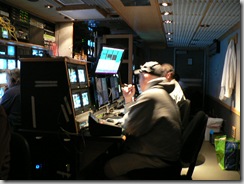 Next to this area is tape-land. This is where all the replays that you see are generated from. The name is a misnomer at this point, an artifact from when actual tape was used. Now everything is stored on hard drive. The move to hard disk means everything is instantly available. In the past they would have to wait for the tape to play, then rewind. Here, 3 gentlemen have hands on shuttles as they rewind and fast forward through everything, marking what might be relevant for later use.
Next to this area is tape-land. This is where all the replays that you see are generated from. The name is a misnomer at this point, an artifact from when actual tape was used. Now everything is stored on hard drive. The move to hard disk means everything is instantly available. In the past they would have to wait for the tape to play, then rewind. Here, 3 gentlemen have hands on shuttles as they rewind and fast forward through everything, marking what might be relevant for later use.
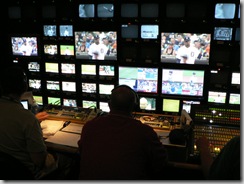 The next part of the truck is home to the producer, the director, the technical director (Byron Vivian), the Fox Box operator, and graphics. This is the largest bank of buttons and TV monitors. From here the director calls out instructions (give me 6, font, clear font)to the technical director who then punches the appropriate buttons from a mammoth board of flashing lights. The producer instructs the director as to what is coming next and what to include. These are things like counting in and out of commercial, sponsored events (i.e. Lincoln Mercury X-mo), and generally constructing the story and enhancing it with stats and graphics.
The next part of the truck is home to the producer, the director, the technical director (Byron Vivian), the Fox Box operator, and graphics. This is the largest bank of buttons and TV monitors. From here the director calls out instructions (give me 6, font, clear font)to the technical director who then punches the appropriate buttons from a mammoth board of flashing lights. The producer instructs the director as to what is coming next and what to include. These are things like counting in and out of commercial, sponsored events (i.e. Lincoln Mercury X-mo), and generally constructing the story and enhancing it with stats and graphics.
The Fox Box operator (Emily Hetrick) controls the score box in the upper left hand corner. When things like pitch count are displayed, or the upcoming telecast window flies out of the right hand side of the box, this is coming from the Fox Box. The radar gun is hooked into the Fox Box. At Comerica Park FS Detroit has its own gun, but in some stadiums they are able to use the scoreboard gun.
The graphics folks (Kelly Wehrmeister and Eric Date), well they do the graphics. There are a number of tools at their disposal. They have media guides for both teams, the internet, and Stats Inc is a phone-able resource during the game. There is also a statistician sitting in the booth with Rod and Mario and the group works in concert to produce the numbers and any other graphics that get displayed during a broadcast.
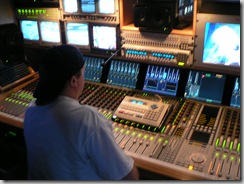 The final area of the truck is the audio booth. It is actually a separate area of the truck with its own entrance. It is a dizzying array of dials and sliders that allow the audio director (Andy Bartley) to cue the music, open and close and level Rod & Mario’s microphones, and manage microphones around the stadium that pick up crowd noise and the crack of the bat.
The final area of the truck is the audio booth. It is actually a separate area of the truck with its own entrance. It is a dizzying array of dials and sliders that allow the audio director (Andy Bartley) to cue the music, open and close and level Rod & Mario’s microphones, and manage microphones around the stadium that pick up crowd noise and the crack of the bat.
The truck itself is a feat of engineering. Iacofano points out that things are a little different for baseball, where the truck is parked and setup for a series and it’s set for at least 3 days. But with most other sports the truck rolls in, plugs in, a broadcast goes up, and everything gets unplugged for the next game.
With the tour of the truck complete and the crew on meal break, it is time to head into the stadium. I head down to the field and meet pregame host, and fill-in radio guy, John Keating in the Tigers dugout.
Keating’s prep for the half hour pregame show starts much earlier in the day. Keating pulled out of his bag a manilla folder that is covered in hand-written notes for that night’s show. Guests for the show are already lined up, and pre-taped segments have been completed at this point. The pregame show itself is quite the undertaking. Chris Wasielewski produced this Tigers Live show and his day started at 8:30 am as he laid out that night’s show.
After observing batting practice it was time to head up to the booth to meet Rod and Mario at about 5:45.
Mario gets to the park about 2:45. He settles into the booth after checking in at the production truck and starts to prepare the storylines for that night’s broadcast. These storylines evolve of course based on the information that is gleaned from pregame meetings with players, managers, and discussions with other broadcasters.
Rod gets to the stadium about an hour after Mario and goes through some of the same machinations. Rod will often watch the same video of the starting pitcher that the players do.
The preparation for both broadcasters starts before they even arrive at the park as they spend their mornings reading through a variety of baseball news sources and Allen will commonly pull up mlb.tv to further scout the opposing starting pitcher.
Both announcers were poring through the team issued game notes while we talked and were highlighting and making notes. Impemba had his laptop open with the MLB scoreboard up and ready. He also is a frequent user of baseball-reference.com when it comes to looking up historical data and splits.
During our time together we talked about the recent 16 inning game and the challenges that come with it. On one hand it is a matter of having enough talking points. While there is quite a bit of material packaged, they don’t really plan on a 5 hour broadcast. The game itself takes on its own story though which can help, and a 16 inning game certainly has enough plot twists. However a far more basic problem is concern about a voice giving out. Talking for 5 hours is tough, announcing for 5 hours is another story.
While talking to the duo, someone else entered the booth. Allen asked me, “do you know this guy?” To which I responded, “I don’t know him, but I know who he is.” The gentleman then said, “I’m Willie Horton, it’s a pleasure to meet you.” I was a little dumbfounded at this point and don’t recall what I said but I think it was along the lines of “uh huh.”
It was nearly time for Rod and Mario to rehearse the open and finish prepping for the game so it was time for a quick bite before heading down to the truck to watch the game from a whole new perspective.
[to be continued…]

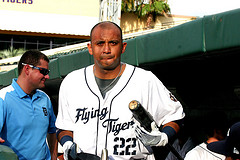
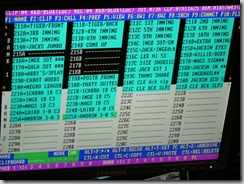
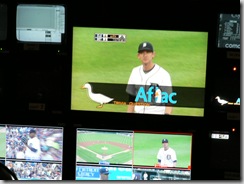


 The final area of the truck is the audio booth. It is actually a separate area of the truck with its own entrance. It is a dizzying array of dials and sliders that allow the audio director (Andy Bartley) to cue the music, open and close and level Rod & Mario’s microphones, and manage microphones around the stadium that pick up crowd noise and the crack of the bat.
The final area of the truck is the audio booth. It is actually a separate area of the truck with its own entrance. It is a dizzying array of dials and sliders that allow the audio director (Andy Bartley) to cue the music, open and close and level Rod & Mario’s microphones, and manage microphones around the stadium that pick up crowd noise and the crack of the bat.